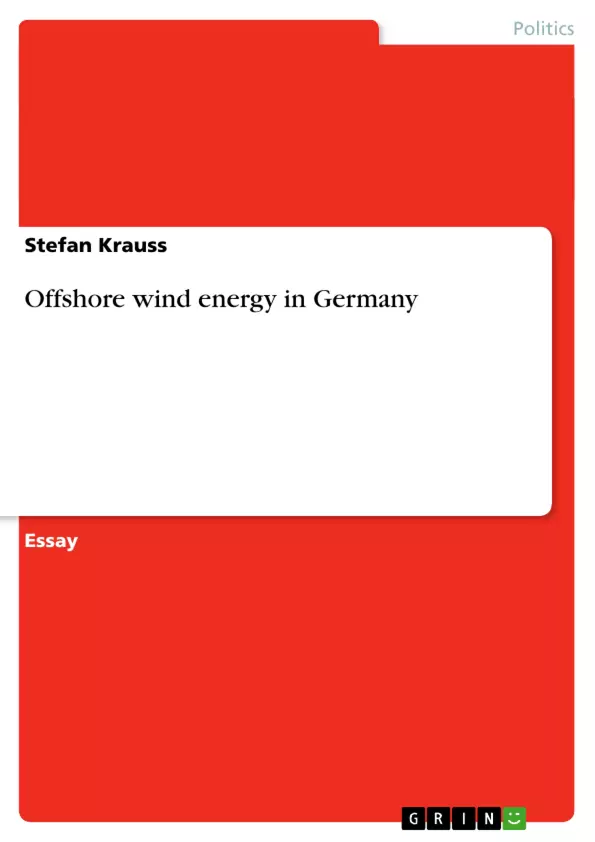Introduction
Today′s Windmills are taller than the cathedrals of the Middle Ages and the cooling towers of the atomic age. They are standing all over Germany and are sharply criticised as well as cheeringly advocated. At present, the discourse of the use of wind energy concentrates on building numerous and large offshore wind farms. In this paper, I will investigate how ′democratic′ is the policy and decision-making process concerning wind energy in Germany. This case study aims to demonstrate the current limits of democracy and suggest how ′more democratic′ practices could be implemented. In order criticise the policy, it is necessary to describe the political context in advance. The lead off will be made by some historic and technical aspects of this technology.
Historic roots and technical aspects
Humans have been using the energy of the wind for centuries. For example, there were over 200 000 windmills all over Europe in the 18t h century. However, the purpose of these windmills was grinding grain and squeezing seeds. The first installation to generate electricity was built by the inventor Charles F. Brush from Cleveland, Ohio in 1888. Apart from some deplorable attempts of the Nazis, wind power in Germany came (back) on the agenda with the oil crisis of 1973. In order to defy the price dictated by the sheiks, there was a lot of research concerning alternative energies. However, the effects are not worth mentioning. Nowadays, there are about 16000 windmills on land in Germany in order to produce electricity. Although this alternative form of electricity production seems ecologically friendly, there are wide spread protests against these highly subsidised monsters. The main arguments are the mutilation of the landscape, insomnia due to the monotonous hum and the disco effect (red lights flashing in the night), the price decline of neighbouring properties, and the considerable number of dead birds.
Inhaltsverzeichnis (Table of Contents)
- Introduction
- Historic Roots and Technical Aspects
- The Political Context
- The Government Change
- Climate Protection
- The Legal Framework: The Renewable Energy Law
- The Limits of Democracy
- Description of the Ways of Public Participation
- Inhibiting Factors for Democratic Deliberation
- Suggestions for Improving Democratic Deliberation
- Summary and Outlooks
Zielsetzung und Themenschwerpunkte (Objectives and Key Themes)
This paper investigates the democratic nature of the policy and decision-making process concerning wind energy in Germany, particularly focusing on offshore wind farms. The case study aims to highlight the current limitations of democracy in this context and propose ways to enhance democratic practices. The analysis considers the political context surrounding wind energy, emphasizing the shift in government and the focus on environmental issues, particularly climate change, which serves as a backdrop for the development of wind energy policy.
- The democratic nature of wind energy policy in Germany
- The political context surrounding the development of wind energy policy
- The role of climate change in driving the expansion of wind energy
- The limitations of democratic deliberation in the context of wind energy policy
- Suggestions for improving democratic participation in wind energy decision-making
Zusammenfassung der Kapitel (Chapter Summaries)
- Introduction: This chapter introduces the topic of wind energy in Germany, focusing on the debate surrounding the construction of large offshore wind farms. The paper aims to analyze the democratic nature of the policy and decision-making processes involved in the development of wind energy.
- Historic Roots and Technical Aspects: This chapter provides a historical overview of wind energy, tracing its development from traditional windmills used for grinding grain to the modern use of wind turbines for electricity generation. It also discusses technical challenges associated with offshore wind farms, including foundation construction, corrosion resistance, and electricity transmission.
- The Political Context: This chapter examines the political factors that have influenced the development of wind energy policy in Germany. It highlights the government change in 1998, which resulted in a more environmentally focused agenda, and the role of climate change in driving the push for renewable energy sources. The chapter also discusses the Renewable Energy Law (REL) and its impact on the expansion of wind energy.
- The Limits of Democracy: This chapter investigates the democratic aspects of the wind energy policy process in Germany. It examines the existing mechanisms for public participation and deliberation, highlighting their limitations and identifying factors that hinder democratic decision-making. The chapter also explores ways to enhance democratic deliberation and strengthen public participation in wind energy policy development.
Schlüsselwörter (Keywords)
The key concepts explored in this paper include wind energy, offshore wind farms, democracy, public participation, democratic deliberation, climate change, Renewable Energy Law (REL), and policy development. The paper examines the challenges and opportunities related to balancing environmental concerns, economic interests, and democratic principles in the context of wind energy policy in Germany.
Frequently Asked Questions
What is the focus of this paper on offshore wind energy?
The paper investigates the democratic nature of the policy and decision-making processes regarding wind energy in Germany, specifically focusing on offshore wind farms.
How has wind energy technology evolved in Europe?
It evolved from 18th-century windmills used for grinding grain to modern high-tech turbines generating electricity, with a significant push occurring after the 1973 oil crisis.
What are the main criticisms against wind turbines?
Common arguments include the "mutilation" of the landscape, noise pollution causing insomnia, the "disco effect" of flashing lights, declining property values, and bird mortality.
What role does the Renewable Energy Law (REL) play?
The REL provided the legal framework that significantly incentivized and drove the expansion of renewable energy sources in Germany.
What are the limits of democracy in wind energy policy?
The paper highlights inhibiting factors for democratic deliberation and identifies limitations in current public participation mechanisms.
What technical challenges are unique to offshore wind farms?
Key challenges include foundation construction in the sea, protecting components against salt-water corrosion, and efficient electricity transmission to the mainland.
- Citation du texte
- Stefan Krauss (Auteur), 2004, Offshore wind energy in Germany, Munich, GRIN Verlag, https://www.grin.com/document/28112



